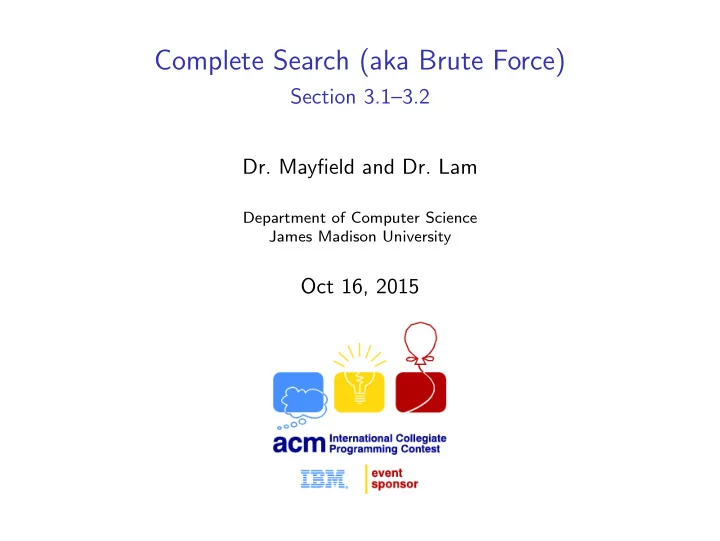

Complete Search (aka Brute Force) Section 3.1–3.2 Dr. Mayfield and Dr. Lam Department of Computer Science James Madison University Oct 16, 2015
CS: Just do it! Complete search = try every possibility ◮ Should never give you Wrong Answer ◮ Might result in Time Limit Exceeded Example: find the min/max number in an array KISS principle http://en.wikipedia.org/wiki/KISS principle ◮ Keep it simple, stupid ◮ Keep it short and simple ◮ Keep it simple and straightforward Oct 16, 2015 Complete Search (aka Brute Force) 2 of 15
Iterative search Example 1: Selection sort ◮ For each position, find the max (of what’s left) Example 2: Naive GCD ( m , n ) ◮ Try all k from min ( m , n ) to 1 ◮ Test if each k divides m and n Example 3: Primality test ◮ Try all k from 2 to √ n ◮ Test if each k divides n Oct 16, 2015 Complete Search (aka Brute Force) 3 of 15
UVa 725: Division Find and display all pairs of 5-digit numbers that: 1. Use the digits 0 through 9 once each 2. first number / other number == N Hints: just try them all ◮ Search from 01234 to 98765 / N ◮ Use a bitset to track digits 0..9 ◮ Other number = first number * N Oct 16, 2015 Complete Search (aka Brute Force) 4 of 15
UVa 11742: Social Constraints n movie goers with m seating constraints ◮ e.g., a and b must be at most c seats apart ◮ How many possible seating arrangements? Hint: explore all permutations #include <algorithm> int p[] = {0, 1, 2, 3, 4, 5, 6, 7}; do { // check each social constraint } while (next_permutation(p, p + 8)); Oct 16, 2015 Complete Search (aka Brute Force) 5 of 15
Java permutations import java.util.*; class Permute<T> { public void permute(List<T> items, int n) { if (n == items.size()-1) { // handle a permutation } else { for (int i=n; i<items.size(); i++) { Collections.swap(items, i, n); permute(items, n+1); Collections.swap(items, i, n); } } } } Oct 16, 2015 Complete Search (aka Brute Force) 6 of 15
Permute examples public static void main(String[] args) { List<String> letters = Arrays.asList("A", "B", "C", "D"); (new Permute<String>()).permute(letters, 0); List<Integer> nums = Arrays.asList(1, 2, 3, 4, 5); (new Permute<Integer>()).permute(nums, 0); } Oct 16, 2015 Complete Search (aka Brute Force) 7 of 15
What if the search space is too big? Don’t explore infeasible/inferior solutions. Oct 16, 2015 Complete Search (aka Brute Force) 8 of 15
Pruning the search space http://en.wikipedia.org/wiki/Eight queens puzzle � 64 � = 4,426,165,368 possibilities 8 Oct 16, 2015 Complete Search (aka Brute Force) 9 of 15
Recursive backtracking General approach ◮ Break down problem into n sub-problems ◮ Initialize solution to empty, then Solve(1) Algorithm Solve(i) for each x ∈ P i solution x to sub-problem i add x to solution if solution is promising does not violate constraints if i == n output solution solved all the sub-problems else solve(i + 1) recursively solve next sub-prob remove x from solution Oct 16, 2015 Complete Search (aka Brute Force) 10 of 15
UVa 524: Prime Ring Problem Reminder from 2nd week: 1. Write code to read the input ◮ Debug by printing the input 2. Write code to print the output ◮ Double check the formatting 3. Write code to solve the problem ◮ In this case, use backtracking You’ll also need to test for primes ◮ Since 0 < n ≤ 16, brute force is good enough ◮ http://en.wikipedia.org/wiki/Primality test Oct 16, 2015 Complete Search (aka Brute Force) 11 of 15
Don’t forget to read! Section 3.2.3 Tips 1. Filtering versus generating 2. Prune search space early 3. Utilize symmetries 4. Pre-Computation 5. Try solving it backwards 6. Optimizing your source code 7. Use a better data structure Oct 16, 2015 Complete Search (aka Brute Force) 12 of 15
C++ Tips of the Week Oct 16, 2015 Complete Search (aka Brute Force) 13 of 15
Standard error All processes have three I/O streams: 1. Standard in (cin / System.in) 2. Standard out (cout / System.out) 3. Standard error (cerr / System.err) Tip: print debug output to cerr while (cin >> word) { cerr << "Next word: " << word << endl; ... } ◮ cerr is ignored by most judges (including UVa) ◮ Excessive output might slow down execution ◮ Java: use System.err.println Oct 16, 2015 Complete Search (aka Brute Force) 14 of 15
64-bit integers Historical compromise ◮ C++ long may be 32-bits ◮ C++ long long is 64-bits Java fixed this problem ◮ int is always 32-bits ◮ long is always 64-bits ◮ java.math.BigInteger ◮ Implemented with int[] ◮ Lots of useful methods Oct 16, 2015 Complete Search (aka Brute Force) 15 of 15
Recommend
More recommend